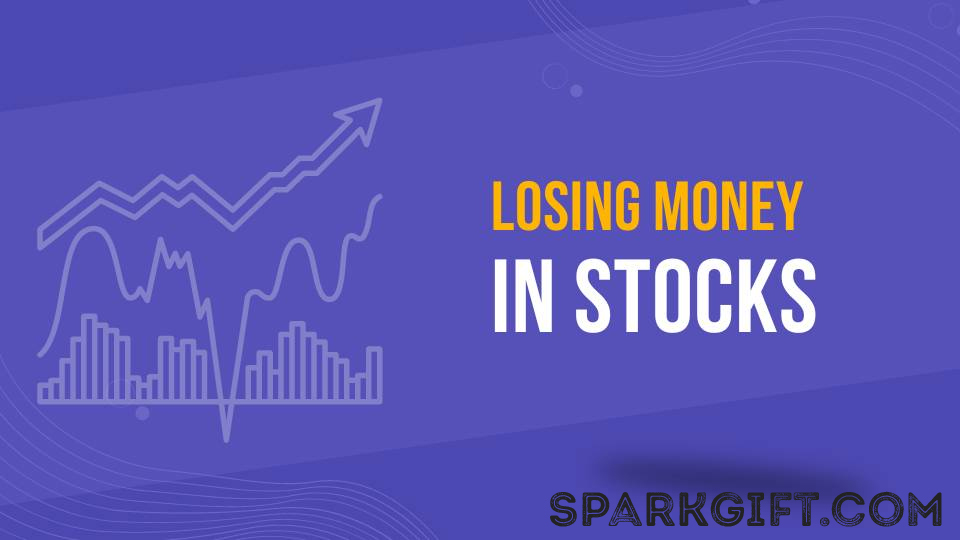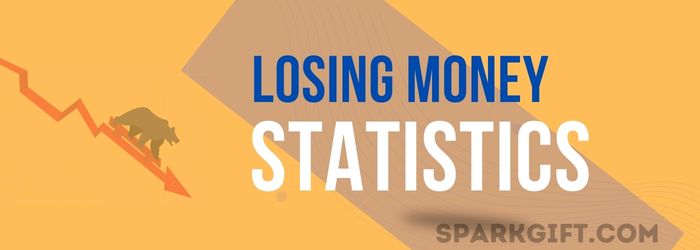Report Highlights:
- Even the biggest investors lose sometimes.
- Passive investing is more effective than active fund management.
- While the stock market is unpredictable, there are ways to still profit from the stock market.

Investing in the stock market can be thrilling, but it can also be heart-wrenching.
With its unpredictable nature and volatile swings, the stock market is not for the faint of heart. However, what hurts the most is not the market’s ups and downs, but the fact that investors often lose money in stocks through no fault of the market itself.
According to a recent survey, up to 92% of individual investors have lose money, if they keep trading for more than 1 year.
That’s almost everyone!
So, if you’re one of the 92%, you’re not alone. But, why do people lose money in stocks, despite all the media hype about the stock market being a place to get rich quick?
If you are part of the Wallstreetbets subreddit, then you maybe have a gambling problem. But there are many many other factors as well.
Why You’re Losing Money in Stocks
I’ve been investing in the stock market for over a decade and have seen it all – the good, the bad, and the ugly. Through my journey, I’ve discovered some of the most common reasons why investors lose money in stocks.

You Thought Research and Analysis Was Unnecessary or a Waste Of Time
Investing in a company simply because you recognize its name or received a hot stock tip from a friend is a trap many investors fall into. Lack of research and analysis is a recipe for disaster. It’s essential to thoroughly research a company, its industry, and the economy before investing in its stock.
Emotions Run Rampant
Emotions can play a significant role in investing, especially during market swings. Fear of losing money can lead to selling low, while greed can lead to buying high. It’s crucial to have a plan and stick to it, rather than making impulsive decisions based on emotions.
Diversification Takes a Back Seat
Investing heavily in one stock or industry is a common mistake many investors make. A lack of diversification can lead to big losses if that stock or industry takes a hit. Diversifying your portfolio by investing in a mix of stocks, bonds, and other assets can help reduce the risk of loss.
Timing the Market is a Losing Battle
Trying to time the market is a futile effort for most investors. The stock market can be volatile, and it’s challenging to predict when it will go up or down. Instead of trying to time the market, focus on long-term investing.
Being Too Conservative or Too Aggressive
Investors can also lose money by being too conservative or too aggressive. Being too conservative can result in missing out on potential gains, while being too aggressive can lead to big losses. Finding a balance and having a well-diversified portfolio is key.
Underestimating Risk
Risk is an inherent part of investing, but many investors don’t fully understand the risks involved in the stock market. Educating yourself on the risks involved in stock investment and only investing money that you can afford to lose is crucial.
Overlooking the High Fees
Investing in the stock market can come with high fees, including brokerage fees, management fees, and other charges. These fees can eat away at your profits really fast.
3 Valuable Statistics You Should Know

1. Active vs Passive Investing
The statistics paint a bleak picture for active fund management. The annual study conducted by S&P Dow Jones Indices highlights a growing disparity between active and passive management strategies. The latest findings reveal that a staggering 85% of large-cap funds failed to keep pace with the S&P 500 after 10 years. It’s over 90% after 15 years.
What should you do? Stick to passive investing!!!
Alternative: If you still want a little bit of excitement, trade with only a small amount of money.
2. The Pros vs The Market
Even Berkshire Hathaway could only slightly outperform the market in the last 15 years. There was only a 0.3% premium when compared to the SP500.
What should I do? Buy broad index ETFs. Don’t let your portfolio be managed by anybody.
3. Markets Keep Growing
The regulated open-end fund industry continues to grow at a staggering pace. With total worldwide assets invested in these funds reaching $71.1 trillion, it’s clear that more and more individuals and organizations are turning to these investment vehicles to grow their wealth. The United States leads the way with $34.2 trillion invested, followed by Europe with $23.3 trillion. These figures highlight the continued confidence in regulated open-end funds
What should I do? It is probably a good idea to have at least some of your portfolio in stocks.
Most Gut-Wrenching Stock Market Crashes in Recent History
“As the saying goes, ‘History repeats itself.’ And when it comes to the stock market, the losses can be just as memorable as the gains.
You think a -30% is bad? Take a look at these:
- 1929 Stock Market Crash: The Great Depression resulted in a 90% loss of the stock market’s value.
- 2008 Financial Crisis: The crisis resulted in a 57% loss of the S&P 500 index.
- 2000 Dot-com bubble burst: The tech-heavy NASDAQ index lost 78% of its value.
- Black Monday 1987: The S&P 500 saw a one-day loss of 22.6%.
- 2020 COVID-19 pandemic: The global pandemic caused a 34% loss in the S&P 500.
What should I Do? Create a long-term plan. Don’t sell at a loss. Buy ETFs.
Most Infamous Losses Suffered by Well-known Traders
- Legendary investor Warren Buffett made a costly mistake in his investment in airline stocks during the pandemic. His Berkshire Hathaway portfolio saw a significant drop in value due to its holdings in the industry. Those stocks doubled in price, a few months later.
- Another famous trader, George Soros, made a big bet on the British pound in 1992, resulting in nearly $1 billion loss. Despite the setback, Soros has continued to be a successful and influential investor in the decades since.
- Former hedge fund manager, Bill Ackman, had a rough ride with his investment in Valeant Pharmaceuticals. He bet big on the stock, only to see it lose over 90% of its value in the face of regulatory and financial issues.
So what did we learn here? These losses serve as a cautionary tale for all investors. No matter how experienced or successful you may be, the stock market can always throw curveballs. The key is to learn from your mistakes and always have a long-term perspective.
I lost $50k – $100k in the Stock Market
I see many amateur traders posting these massive losses of $50k and $100k. Well that really sucks.
All you can do now is to analyze the situation and find out where you made a mistake.
Maybe you sold too soo?
Maybe stock trading is not for you?
We can’t all be winners after all.
Is it normal to lose money on the stock market?
If you do short term trading, then yes, losing is part of the game. There is absolutely nobody who wins 100% of the time. Investments fluctuate, and that includes stocks.
What should I do to avoid this? Don’t panic when your portfolio is in the red. Ride it out.
References:
- https://www.cnbc.com/2020/09/18/stock-picking-has-a-terrible-track-record-and-its-getting-worse.html
- https://markets.businessinsider.com/news/stocks/warren-buffett-berkshire-hathaway-missed-5-billion-selling-airline-stocks-2021-3-1030224860
- https://www.bloomberg.com/news/articles/2022-12-23/rolling-losses-and-fakeouts-squeezing-hope-out-of-stock-market
